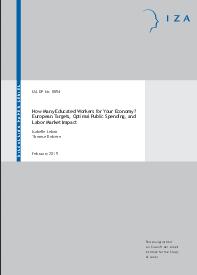Davíðsdóttir, S. (2015) “Cyprus and Iceland: a tale of two capital controls“, A Fistful of Euros – European Opinion Blog, 06 Μαρτίου. Both in Cyprus and Iceland foreign funds flowed into the islands, in the end forcing the government to make use of extreme measures when the tide turned. These measures are normally called ‘capital controls’ which in these two cases hides the fact that the measures used are …Read More
Austerity and recovery: East Asian lessons for Europe
Chari, Α. & Blair Henry, Ρ. (2015) “Austerity and recovery: East Asian lessons for Europe“, VoxEU Organisation, 06 Μαρτίου. In the wake of the Great Recession, a contentious debate has erupted over whether austerity is helpful or harmful for economic growth. This column compares the experiences of the East Asian countries – whose leaders responded to the East Asian financial crisis with expansionary fiscal policy – with those of …Read More
Macroprudential spillovers: The role of organisational structure
Danisewicz, Ρ., Reinhardt, D. & Sowerbutts, R. (2015) “Macroprudential spillovers: The role of organisational structure“, VoxEU Organisation, 05 Μαρτίου. In a global financial system, macroprudential policies may create international spillovers. This column presents new evidence on how the organisational structure of a bank affects the magnitude of these spillovers. An increase in capital requirements at home causes foreign branches to reduce their lending growth to other banks operating in …Read More
The EU risks alienating the Moldovan population if it fails to take a tougher line with the country’s pro-European parties
Cenusa, D. (2015) “The EU risks alienating the Moldovan population if it fails to take a tougher line with the country’s pro-European parties“, LSE EUROPP, 05 Μαρτίου. The EU signed an association agreement with Moldova in 2014. Denis Cenusa writes on the EU’s relations with the country since 2009, when a pro-European alliance of parties first came to power. He argues that the failure of these parties to successfully …Read More
How Many Educated Workers for Your Economy? European Targets, Optimal Public Spending, and Labor Market Impact
Lebon, Ι. & Rebière, Τ. (2015) “How Many Educated Workers for Your Economy? European Targets, Optimal Public Spending, and Labor Market Impact“, IZA DP No. 8854, Φεβρουάριος. This paper studies optimal taxation schemes for education in a search-matching model where the labor market is divided between a high-skill and a low-skill sector. Two public policy targets –maximizing the global employment level and optimizing the social surplus– are studied according …Read More
Crime scars: Recessions and the making of career criminals
Bell, B., Bindler, A. & Machin, S. (2015) “Crime scars: Recessions and the making of career criminals“, VoxEU Organisation, 04 Μαρτίου. Recessions can lead to an increase in youth unemployment, which could later negatively affect labour market outcomes. This column explores the effect of recessions on criminal activity. The findings indicate a substantial effect on initiating and forming youth careers. There is initially strong and eventually long-lasting detrimental effect …Read More
What does it really mean to be ‘pro-business’?
Ha-Joon Chang (2015) “What does it really mean to be ‘pro-business’?“, The Guardian, 03 Μαρτίου. Despite the best efforts of some of its members to discredit it with market rigging, tax avoidance, and unjustified bonuses, the business community is still held in awe in Britain. Any suggestion of higher taxes for top earners or tougher regulations on the abuse of market power is howled down as dangerously anti-business. Politicians …Read More
A Global Projection Model for Euro Area Large Economies
Jakab, Ζ., Lukyantsau, Ρ. & Wang, S. (2015) “A Global Projection Model for Euro Area Large Economies“, IMF Publications, Working Paper No. 15/50 The GPM project is designed to improve the toolkit for studying both own-country and cross-country linkages. This paper creates a special version of GPM that includes the four largest Euro Area (EA) countries. The EA countries are more vulnerable to domestic and external demand shocks because …Read More
Corporate Taxation in Europe: Let’s get it together!
De Groen, P. W. (2015) “Corporate Taxation in Europe: Let’s get it together!“, Financial Markets, CEPS Commentaries, 16 Φεβρουαρίου More comprehensive cooperation in corporate taxation at European level could significantly advance the region’s socio-economic prosperity, but its potential contribution is unfortunately overlooked in the current search for growth and job creation. Lucrative tax niches established in some member states and the fear of losing fiscal autonomy prevent several countries from …Read More
Capital taxation in the 21st century
Auerbach, J. A. & Hassett, K. (2015) “Capital taxation in the 21st century“, VoxEU Organisation, 03 Μαρτίου. Piketty’s justification for his proposed wealth tax relies on the notion that the rate of return on capital exceeds economic growth. This column challenges this basis, arguing that it fails to account for risk. The authors also examine the relative merits of a consumption tax, which may be more valid. In Capital …Read More





